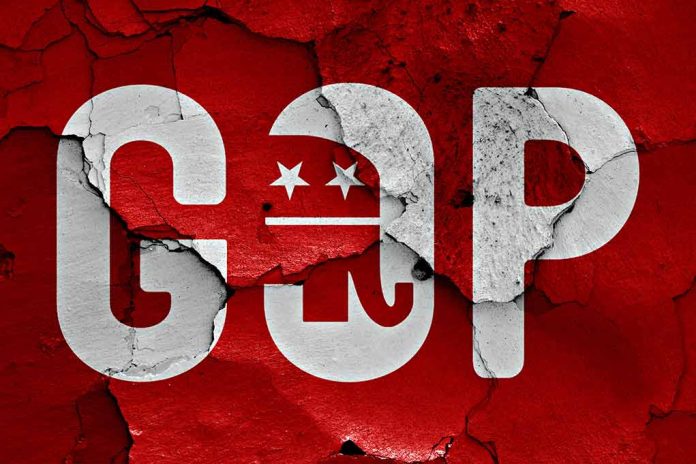
Senate Republicans face heat from President Trump as four members, including Susan Collins and Rand Paul, join Democrats to block Canada tariffs in a 51-48 vote that threatens party unity on border security policy.
Key Takeaways
- Four Republican senators – Mitch McConnell, Susan Collins, Lisa Murkowski, and Rand Paul – broke ranks to support a Democratic resolution blocking tariffs on Canada.
- President Trump publicly criticized the Republican defectors, accusing them of “playing into the hands of Radical Left Democrats and Drug Cartels”.
- The resolution argues the emergency declaration for Canadian tariffs is based on exaggerated fentanyl concerns, as most trafficking occurs at the southern border.
- While the Senate approved the measure 51-48, it remains largely symbolic as House leadership has indicated they won’t consider it.
- The dispute highlights growing tensions within the Republican party over trade policy and presidential emergency powers.
Senate Vote Challenges Trump’s Canada Tariff Strategy
The Senate approved a measure to block President Trump’s tariffs on Canada with a narrow 51 to 48 vote, with four Republican senators breaking ranks to join Democrats in opposition to the administration’s trade policy. Senators Mitch McConnell, Susan Collins, Lisa Murkowski, and Rand Paul defied significant party pressure to support the Democratic-led resolution, which seeks to terminate the national emergency declaration used to impose the tariffs on Canadian goods.
Democratic Senator Tim Kaine of Virginia, who spearheaded the resolution, argued against the justification for the tariffs before the vote. Kaine called the tariffs ‘attacks on everyday people,’ and said ahead of the vote that the president has justified the imposition of these tariffs on ‘a made up emergency.’ The resolution specifically challenges the administration’s claim that Canadian border security issues represent a genuine national emergency requiring tariff implementation.
51-48: The Senate passes a resolution to block Trump's tariffs on Canada.
4 Republicans joined Democrats in voting yes:
• Susan Collins
• Mitch McConnell
• Lisa Murkowski
• Rand PaulThe measure is not expected to get a vote in the House. pic.twitter.com/gHtQaU6Tti
— The Recount (@therecount) April 2, 2025
Trump’s Sharp Rebuke of Republican Defectors
President Trump did not mince words in his criticism of the Republican senators supporting the resolution. In a late-night Truth Social post, he directly named the four Republican senators and questioned their loyalty to party principles on border security. Trump urged the senators to “get on the Republican bandwagon, for a change,” suggesting their opposition represented a pattern of breaking from party unity rather than a principled policy disagreement.
The president emphatically urged Republican unity in his social media messaging. “Don’t let the Democrats have a Victory,” he stated. “It would be devastating for the Republican Party and, far more importantly, for the United States.” Despite the president’s warnings, the four Republican senators maintained their opposition to the emergency declaration, prioritizing their concerns about the economic implications of tariffs on a close ally.
Collins and Paul Stand Firm on Principles Despite Pressure
Senator Susan Collins of Maine has been particularly vocal about her opposition to the tariffs, citing significant economic concerns for her constituents. As a border state with Canada, Maine has extensive trade relationships that could be severely impacted by new tariffs. Collins defended her position publicly despite direct criticism from the president. “Imposing tariffs on Canada, which is our closest neighbor, a friendly ally, is a huge mistake and will cause disruption in the economies of both countries,” said Collins.
Senator Rand Paul’s opposition stems from constitutional concerns about emergency powers rather than specific objections to the tariff policy itself. Paul has consistently opposed expansive use of emergency declarations by presidents of both parties, arguing that trade policy should require congressional approval. Senate GOP leadership, meanwhile, strongly backed the president’s emergency declaration as essential to national security.
Resolution Likely Symbolic Despite Senate Passage
Despite clearing the Senate, the resolution faces significant hurdles before it could actually block the tariffs. House Republican leadership has indicated they will not take up the measure, effectively preventing it from reaching the president’s desk. Even if it did advance further, President Trump has already vowed to veto the resolution, which would require a two-thirds majority in both chambers to override – a threshold far beyond the current level of opposition.
The administration maintains that the tariffs are critical for enhancing border security and combating fentanyl trafficking. While opponents of the emergency declaration point out that the overwhelming majority of fentanyl enters through the southern border with Mexico, administration officials cite growing concerns about Canada becoming a secondary route. The Customs and Border Patrol reported seizing nearly 50,000 pounds of fentanyl over the last two fiscal years, though statistics specifically for the northern border remain disputed.
The Senate vote, while largely symbolic, underscores growing tensions within the Republican party over trade policy priorities and the proper scope of presidential emergency powers, tensions likely to persist as the administration pursues its broader trade agenda with other nations in the coming months.
Sources:
4 Republicans join Senate Democrats to rebuke Trump tariffs on Canada
Trump blasts 4 GOP senators over possibly scrapping Canada tariffs: ‘What is wrong with them’



